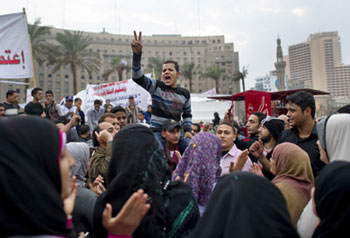(front page)
Egypt protests condemn
continued military rule
Workers, youth grapple with road forward

|
|
Odd Andersen/AFP/Getty Images
|
|
Protest in Cairo’s Tahrir Square against military rule Nov. 29. Seeking electoral gains, Muslim Brotherhood shunned protests following Nov. 18 government attack on demonstrators.
|
BY SETH GALINSKY
After several days of protests in Tahrir Square calling on the military to hand over the government to civilian rule, the Egyptian Army high command made clear it has no intention of relinquishing its control.
“The position of the armed forces will remain as it is,” Mohamed Hussein Tantawi, head of the Supreme Council of the Armed Forces, said Nov. 27 on the eve of elections to parliament. “It will not change in any new constitution.”
The weeklong protests were ignited after the Muslim Brotherhood, the military’s main contender for power, had filled Tahrir Square Nov. 18 in response to the high command’s announcement of restrictions on the committee that will write a new constitution following elections.
Later that night riot police attacked a smaller number of protesters who remained in the square. Although the Muslim Brotherhood told its supporters to stay away and concentrate instead on winning the elections, tens of thousands of working people, students and others, outraged at the attack, flooded the square.
Over the next nine days 41 protesters were killed and more than 2,000 wounded in clashes with the cops and soldiers around the country, according to Al Jazeera.
Tantawi dismissed the cabinet and appointed Kamal el-Ganzouri prime minister. Ganzouri was prime minister under former president Hosni Mubarak in the 1990s.
“We are tired of the false promises of democracy, of jobs and compensation for those who were injured during the revolution against Mubarak,” Maie Sherefay, 21, one of those who went to Tahrir Square after the attack, told the Militant in a phone interview from Cairo. “The police were brutal. They shot at people with live ammunition. We need someone else in power who would be trustworthy, not the military.”
The April 6 Youth Movement and the Revolution Youth Coalition, two groups involved in protests, call on the military to appoint a government of “national salvation” headed by Mohamed ElBaradei, former head of the U.N. International Atomic Energy Agency.
The Egyptian Federation of Independent Trade Unions urged its members to join the protests. Strikes in textile and other industries in the last few months have won some wage and benefit increases. However, “there has been no answer to the demands of the Egyptian working class for a rise in the minimum wage and pensions,” the federation said in a statement. “Meanwhile workers face victimization” and the firing of union activists, with some facing charges before military courts.
Some at Tahrir Square called for a boycott of the elections. “Not a single party showed up in the square,” Maggie Osama told Al Jazeera. “All the parties are looking for chairs in the parliament.”
“I don’t really like any of the parties, but we need to vote to get a new constitution,” Heidi Hisham Hanafy told the Militant. Hanafy was hit by tear gas when passing by Tahrir Square from work Nov. 20.
The demonstrations in Tahrir Square dwindled as the polls opened for the first day of elections Nov. 28, with long lines of voters.
There are more than 6,700 candidates for elections to the two houses of the parliament. The 47 competing political parties range from Islamist groups, including Salafists and the Muslim Brotherhood that want to impose some form of Sharia law, to “liberal” secular capitalist parties such as the Free Egyptians party headed by billionaire telecoms tycoon Naguib Sawiris, and forces allied with ElBaradei. The complicated balloting will take place in stages through March.
The Muslim Brotherhood is expected to win a plurality in the elections.
“They are very well organized with lots of money, the most experience of any party, and well trained,” Karam Youseff, a bookstore owner in Cairo, told the Militant. “In the countryside, in the city, in every alley, everyplace you see the Muslim Brotherhood, giving away food, helping in hospitals. They have a big base in the streets.”
Youseff, who is voting for a social-democratic coalition, says the secular parties “need lots of time to reach people in Upper Egypt and the countryside” and compete effectively against the Muslim Brotherhood. For this to happen she thinks the military needs to maintain control for the time being.
Alaa Hani Murad, a recent graduate from the British University in Cairo, has a different point of view. The appointment of Ganzouri and the attacks on protesters “show how reactionary the Supreme Military Council is,” she told the Militant by phone. “They should go back to the barracks as fast as possible.”
Army one of largest employers in Egypt
High-ranking army officials are an integral part of Egypt’s capitalist class. The military, which owns farms and large factories, is one of the single largest employers in Egypt today.
When the military regime ousted Mubarak in February following the large protests, they were also protecting their own business interests.
Many armed forces commanders had opposed plans by Mubarak to be succeeded by his son Gamal, who unlike every other president since the overthrow of the king in 1952 was not a high-ranking military officer.
As the military regime prepares further repression, workers at the Suez seaport recently refused to unload a seven-ton shipment of tear gas from Wilmington in the U.S. destined for use by the police, according to Al Ahram.
Related articles:
Eyes on working class in Egypt
| 


